
Topics
Guests
- Francisco Rodríguezassistant professor of economics and Latin American studies at Wesleyan University and the former chief economist of the Venezuelan National Assembly.
- James Petrasauthor and journalist. He is professor emeritus of sociology and Latin America studies at SUNY Binghamton and author of the book, Social Movements and State Power.
Venezuelan President Hugo Chavez announced on Thursday that his government would move toward nationalizing major parts of the country’s oil industry. The announcement came just one day after the Venezuelan National Assembly agreed to Chavez’s request that he be allowed to rule by decree for the next 18 months. Since being re-elected in December with 63 percent of the vote, Chavez has put forward a series of sweeping reforms that will lay the groundwork for what he describes as “Bolivarian socialism.” Critics of this measure say it gives Chavez far too much authority. We host a debate. [includes rush transcript]
Transcript
AMY GOODMAN: Venezuelan President Hugo Chavez announced Thursday his government would move toward nationalizing major parts of the country’s oil industry. Beginning on May 1st, Chavez said the government will take majority control of oil projects in the Orinoco River basin. The move will affect several major international oil companies, including Chevron, ExxonMobil, ConocoPhillips and BP. The announcement came just one day after the Venezuelan National Assembly agreed to Chavez’s request that he be allowed to rule by decree for the next 18 months. The legislation will allow Chavez to transform 11 areas, including the economy and defense.
Since being re-elected in December with 63 percent of the vote, Chavez has put forward a series of sweeping reforms that will lay the groundwork for what he describes as “Bolivarian socialism.” Chavez says that with this added authority he’ll also plan to nationalize Venezuela’s largest telecommunications company and the electricity sector.
Critics of the measure say it gives Chavez far too much authority. They predict that nationalizing Venezuela’s industries will ultimately stunt Venezuela’s economic growth. President Bush told Fox News earlier this week, quote, “I am concerned about the undermining of democratic institutions. And we’re working to help prevent that from happening.”
To discuss the situation in Venezuela, we turn to two guests: James Petras is professor emeritus of sociology and Latin America studies at SUNY Binghamton, author of the book Social Movements and State Power; Francisco Rodriguez is assistant professor of economics and Latin American studies at Wesleyan University and the former chief economist of the Venezuelan National Assembly. We welcome you both to Democracy Now!
Let’s begin in the studio in Hartford with Francisco Rodriguez. Your concerns right now about the move, the National Assembly granting Chavez the power to rule by decree?
FRANCISCO RODRIGUEZ: Well, I think that what’s happening in Venezuela is that President Chavez has increased his scope of power and has increased the concentration of power in his person, and it’s a gradual process that we’ve seen happening over the past few years, where the Supreme Court is under the control of his followers, the Assembly is 100 percent — all of the members of the Assembly are backers of President Chavez. The Electoral Council is very clearly stacked with his followers. The former president of the Electoral Council, who supervised the 2004 vote count, is now his vice president. And this is just one more step, in which the president is concentrating power. He doesn’t really even trust his Assembly, even though it’s filled with his backers, and he wants to be able to legislate directly.
Now, this figure of enabling law, the law that enables the president to rule by decree, has been used previously in Venezuela, but in the past it used to be very well circumscribed to specific areas of legislation, such as during the debt crisis. The president was granted authority to legislate on particular economic issues. But now what we’re seeing is an enabling law that will allow President Chavez to rule by decree in just about every area of the Venezuelan economy and society. It’s couched in very vague terms, such as social and economic rights transforming state institutions. For the first time in history, the president will have the right to rewrite organic laws, which are laws of constitutional rank, which generally would take a two-thirds majority in the Assembly to change them, but now he will be allowed to do that by decree. So we are seeing a lot of power put in the hands of the president, and we’re seeing something very close to the end of any type of separation of power in Venezuela.
AMY GOODMAN: Professor James Petras, your response?
JAMES PETRAS: These measures, as was mentioned, have a precedent in the past, because there’s a great deal of gridlock in the legislative process. Many of the Assembly members, though formerly Chavistas, run the gamut from Christian Democrats, Social Democrats, leftists, and all sorts of other variants. So I think what he’s doing is what a lot of presidents do, is taking — asking and securing fast-track powers to push through an agenda. It’s not very different from what U.S. presidents have done in the past to seek extra powers to deal with emergencies or opportunities to bring about significant changes.
I think this is important also because his social programs have advanced enormously in terms of reduction of prices for consumers in low-income neighborhoods, the vast expansion of the health system, etc. And I think what the people are demanding is that these social measures be accompanied by structural changes, which give Venezuela effective control.
Now, if you look at the specific measures, the 60 percent share of the oil industry, these are joint ventures, and I think it needs to be emphasized that the model of 21st century socialism that Chavez has outlined is simply in line with a mixed economy. Nationalizing the electric power is not something unusual, because it allows the government to lower costs for downstream enterprises, and I think the telecommunications also is a factor in spurring new investments and profits downstream. I think, again, this business about concentrating power — let’s not forget that Chavez was elected with 63 percent of the electorate. He has a mandate, and this, to me, is a kind of plebiscite to him to get on with structural changes and not merely welfare measures.
AMY GOODMAN: But, Professor Petras, why does he have to rule by decree if he has that kind of support and that kind of support in the Legislature? Why not just have them vote on these issues that they would support?
JAMES PETRAS: Well, because, as I mentioned, Amy, the Legislature is formerly Chavista, but they have proved really incompetent or dilatory in carrying out programs and implementing them. I could mention a host of areas where Congress has lagged behind — for instance, job creation programs, house building, etc. Chavez lays out a legislative agenda, and the people are very supportive of it, the electorate, as is demonstrated, and yet the Congress, even the Chavez Congress, has not been an effective instrument for carrying out these policies. I draw your attention to — in a different context — the demand by Presidents Clinton, Bush, and whoever, for fast-track powers to negotiate huge trade agreements. And that’s because they recognize that special interests and congressional delays can undermine the entire project and destroy public confidence in the elected officials.
AMY GOODMAN: Francisco Rodriguez, your response?
FRANCISCO RODRIGUEZ: Well, I think that it’s very strange to me to talk about gridlock in an Assembly where every single member is a Chavista, where there is not one member who is a representative of the opposition. I do think that there is —
AMY GOODMAN: They boycotted the election, is that right?
FRANCISCO RODRIGUEZ: No, no. That’s right. They boycotted the election. I’m just saying that talking about gridlock in that type of Assembly, where there’s not even one member of the opposition, seems to me to be somewhat strange. Now, they boycotted the election, because the Electoral Council that was counting the votes was, among others, headed by Mr. Jorge Rodriguez, who is now the vice president of President Chavez and a very close supporter and ally.
Now, I think that the fundamental question here is whether there is a value to the separation of powers. Why do we believe that the legislative power should be separated from the judicial power and it should be separated from the executive power? Because we believe that even though a president might be able to win an election with a very large number of votes, which, by the way, there are many interpretations of why that happens. Venezuela is also riding an economic boom, caused by an expansion, a five-fold expansion in oil prices. So, under favorable economic conditions, presidents get re-elected without that necessarily meaning that there’s a mandate to construct a socialist society. But if we think that there is some value to a separation of powers, then we should be very weary about presidents taking authority which is commonly in the sphere of legislative power.
Now, I would just like to point out that, with respect to the success of the social programs that Professor Petras points to, it’s actually very hard to tell how successful these programs have been, and there’s very little serious research that has been done on the subject. There’s a lot of government propaganda. So the government claims that it taught 1.5 million people how to read and write, but there’s really very little way to verify that kind of claims. The research that my colleagues and I have done at Wesleyan and University of Berkeley and the development fund have found that the claims of the government, at least with respect to a literacy program, have been completely overblown. Using the government’s own household surveys, which have measures of illiteracy, we’d find almost no decline in illiteracy during the period during which the literacy program was applied. We’ve also seen that there has been an increase in the number of Venezuelan children who are underheight and underweight. We’ve analyzed the structure of social spending —
AMY GOODMAN: Professor Rodriguez, I wanted to ask your thoughts on the nationalizing of the oil. I mean, you have here President Chavez taking on the most powerful corporations on earth, ExxonMobil, Chevron, etc.
FRANCISCO RODRIGUEZ: Well, actually, there, I would not disagree with Professor Petras. I think that nationalizing the oil industry, as it was done in the '70s in Venezuela under the government of Carlos Andres Perez — many governments have chosen to have national telecommunications industries, national electricity, so I don't think that really the crux of the issue lies there. Actually, Chavez is a very skillful political strategist, and I would entertain the hypothesis that probably he wants to get people talking about this, because he knows that there are a lot more important things that are going on in Venezuela, which maybe they won’t to talk about if they’re centering around the nationalization.
Here’s what worries me. The minister of labor, in a January 12 interview in the national newspaper, Universal, said that they’re working on legislation to include community and workers’ council participation, not only in the decision, but in the profits of all private firms. That’s something that I find very worrying. It worries me that the government is closing down the nation’s oldest private TV station without any type of judicial process, because it accuses it of having participated in the coup, even though there hasn’t been a judicial process to prove that. It’s being closed down, and it’s going to be replaced by a state-run TV station. Also, I think that we are seeing —
AMY GOODMAN: Well, we have to wrap up. Let’s get a response from Professor Petras on that point of the closing of the TV station.
JAMES PETRAS: I think that the professor has left out some contextual variables that are crucially important. The closing down or the termination of the license for the television station is related to the fact the television station was urging on a nonviolent overthrow of the government, elected government, of Venezuela back in 2002. This may be a little late in actually carrying out the law, but I don’t know any democratic government in the world — Western Europe, North America, Latin America, or elsewhere —- which allows a -—
AMY GOODMAN: Professor Petras, we’re going to have to leave it there. Professors Petras and Rodriguez, I want to thank you both for being with us.

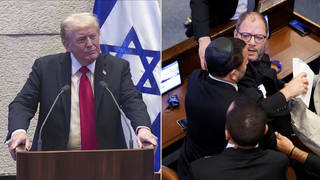

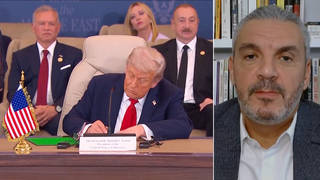
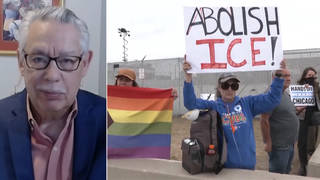





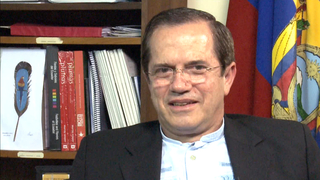
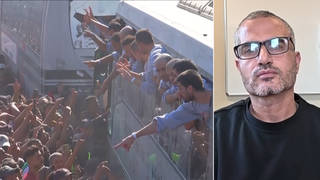
Media Options